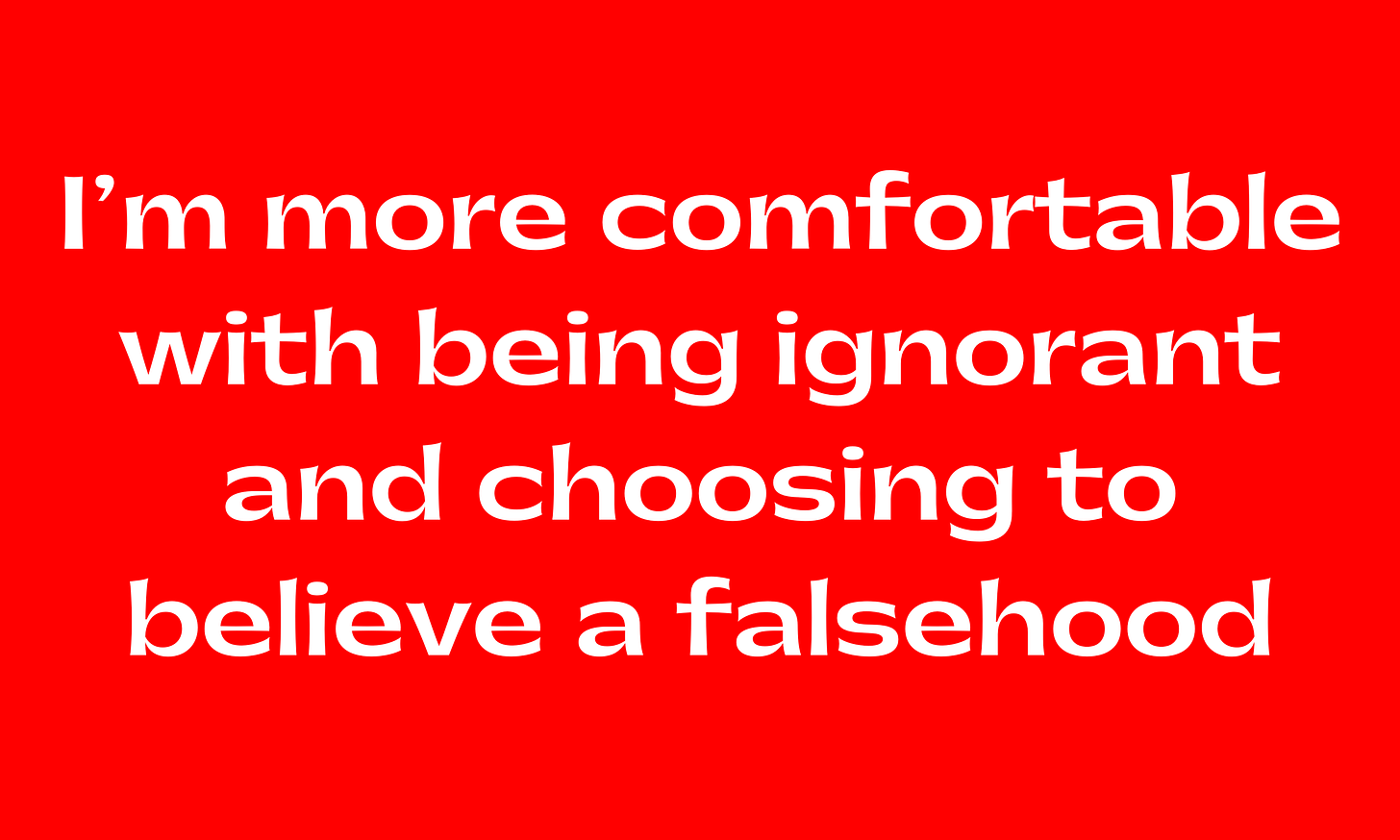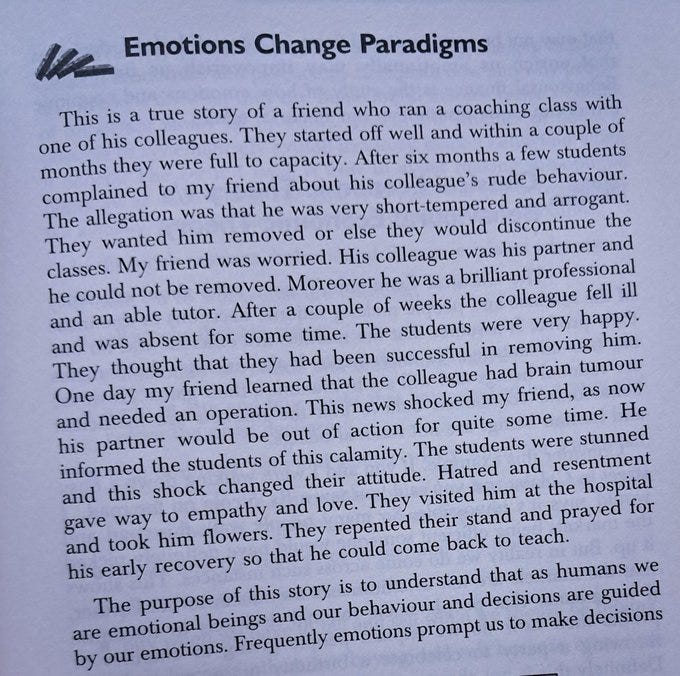Beware of 'Crab Mentality' People
Plus, how people rationalize not believing the truth about you, bad actors' hunting you, Warren Buffet's reputation 'newspaper test,' altruism and sexual opportunities and a strange teacher firing
There are, regrettably, people that we interact with that carry a thinking disorder that affects their decision-making quality and behavior. The “crab mentality” infects business, work and personal relationships.
Robin Wilding, writing at Pragmatic Wisdom, tells a quick story to illustrate. I will follow this excerpt with insight and a recommendation.
“I lived in Mexico for over a decade and my best friend Ceci taught me a lot. But my favorite lesson from her was about ‘crab mentality’ people,” Wilding writes.
“It’s based on how crab fishermen can toss crabs in a bucket and they won’t get out. If one gets close to the top, the others will pull him back down. Crabs pull others back down. Nobody gets out, nobody wins. Nobody gets out of the bucket so nobody can help others do the same.”
Wilding communicates that when interacting with people with a predisposition for self-absorbed behavior, all is not lost because, “People with a solid stance can boost people out of the bucket, and when they’re out, they’ll reach back in to get the others.”
To consider: People afflicted (that’s what it is, an affliction) with the “crab mentality” likely aren’t aware of it but that doesn’t make them less problematic to be around and interact.
They can bring harm to your well-being and I don’t think someone reading this has to make a monumental leap in visualization to realize how badly their personal and professional reputation can be injured by someone with the “crab mentality” because, as mentioned earlier, “If one gets close to the top, the others will pull him back down. Crabs pull others back down. Nobody gets out, nobody wins.”
Have you ever had someone like this in your personal or professional life? If so, you know the experiences and damage and have stories you can tell.
Lamenting it is normal yet if that’s all we do or we ignore it, that’s not helpful.
That’s why we should 1) learn to recognize it happening or better, when it’s beginning to happen and 2) have a responsive strategy that acts as a remedy, not only for us, but if possible, for the benefit of others.
The strategy should be to remain poised and communicate and otherwise act assertively (not nasty aggressive) for ourselves and be respectful leaders (even if we don’t have that title) in our professional and personal lives, helping others see what is beginning to transpire or is already taking place, mention the risk clearly and concisely and show them that the way “out” is the indisputable better “chess move.”
People’s Emotions, Psychology and Behavior That Negatively Impacts You
“When we want to believe something, we ask ourselves ‘Can I believe it?’ Then we search for supporting evidence. When we don’t want to believe something, we ask ourselves “Must I believe it?” Then if we find a single reason to doubt the claim, we can dismiss it.”
Source: Rob Henderson's Newsletter
How do you feel about that reality? Maybe it doesn’t phase you right now but what if you objectively know yourself to have built honorable character and reputation and now it’s being puzzling doubted or criticized?
Does that change your attention and interest?
People are quick to emotionally jump to conclusions, especially when it is a damaging perception. Negativity bias means that as humans we give more weight to negativity than positive perceptions and feelings. People don’t examine their conclusions and emotions. It’s a very convenient emotionally-rooted “out” of doing the “right” thing.
The negativity bias can happen about you, to your detriment, despite the falsehood or falsehoods on which it is built, because as Henderson detailed, when people don’t want to believe something (the truth about our behavior), their emotions lead them to subconsciously ask, “Must I believe it,” to which the answer to themselves is almost always, “No, I don’t. No, I won’t.”
So they become disinterested or respectfully said, maybe lazy, in seeking helpful, accurate information that could alter their thinking and reveal facts and truth they don’t want to believe.
It is easier that way so they can hold on to their anger, resentment and contempt about you and possibly attack your well-being or push for it.
Here’s something else about this human error that leads to mistreatment of others: Are you aware of the Streetlight Effect?

What it is: “A cognitive bias that occurs when people search for something only where it is easiest to look or where there is more light rather than where it is most likely to be found,” writes Jenny Rearick at her Communication Compendium newsletter.
Analysis: Notice that people aren’t trying very hard or wanting to expend sincere effort to find out what is factual and true.
That’s a big problem if your reputation is at stake. It can be helpful to know and recognize, ethically combat it through working to reveal what isn’t being unearthed and communicated and doing so with poise, humility and civility.

Are you familiar with the following term for online act of reputation terrorism and character assassination? Offense archaeology: Digging through someone’s past comments to find speech that can be held against them.
I admittedly write about people and their past communication if it has first first been reported in the media. Does this make me innocent of the dirty behavior? Maybe, in some people’s minds. It doesn’t, however, make me guilty. I do so to examine and write about the reputation angle.
The people who engage in “offense archaeology” as terrorists in a concerted attempt to detonate a bomb in their target person’s life, including the collateral damage of potential innocent bystanders, are distinctly different. They are immoral, with no impulse control and are extremely dangerous.
Hopefully you don’t or won’t live in fear. Yet be smart about communication moving forward and if possible, do what is reasonably possible and honorable to address past comments that might be hurtful or embarrassing.
Many people don’t thoroughly understand the depth and width of importance when it comes to reputation and how much it impacts their life, making it easier, harder or miserable.
There is a popular Warren Buffett quote about it but here is a brief video clip from Twitter that goes deeper about the topic and it’s an invaluable piece of counsel.
Let’s break this down for greater benefit:
“We can afford to lose money but we can’t afford to lose reputation, not a shred of reputation,” Buffett says.
How many short-sighted, unethical people have you met in business or anywhere who could care less about reputation and focus solely on getting the money? These people are walking on thin ice on a hot, winter day. Zero forward thinking or measurement of long-term risk. It’s illogical behavior.
Here’s what else Buffett said:
“I tell (the managers in his business) to judge every action they take, not just by legal standards, although that’s the first test but also by the test, what I call the newspaper test. How would they feel about any given action if they knew it was to be written up the next day in their local paper, to be read by their family, their friends, their neighbors, written by a smart but kind of an ‘unfriendly’ reporter.
“And if it passes that test, it’s okay. And I tell them, that if anything is close to the lines (of danger), it’s out (wrong and unacceptable risk and to be rejected as a decision) and they can always call me if they want to check something, but if they call me, there’s something wrong probably anyway.”
This is a safeguard, a protective railing, smart risk management and a leader who wants himself and his people to stop short of reckless actions.
From: Vivek (@Vivek_Investor) on Twitter. Here is the link.
Analysis: “Hatred and resentment gave way to empathy and love. They visited him at the hospital and took him flowers… they prayed for his early recovery so that he could come back to teach.”
What sort of alternate universe is this story? From what I regularly observe in the world, a person with those behavior weaknesses and bad habits, would have his sickness celebrated by his detractors. It is however a sign that some people can tap deep into their humanity and the shared common concern or fear of severe illness.
“… as humans we are emotional beings and our behaviour (behavior) and decisions are guided by our emotions,” the author writes.
A now deceased negotiation expert once told me that all decisions are emotional. I don’t know that I believed it at the time but I’ve become convinced of it since, that we decide on emotions, whatever they may be and mean to us.
The most logical of people will deny it but that doesn’t mean it’s not factual and true.
In this anecdote above, no, don’t think you have to get sick or feign a terrible condition, to improve how people see you if you have a poor reputation.
Realize though if we can be seen as more human, alike others in that regard and vulnerable, as well as less aggressive, people can come to see us differently and more compassionately. We don’t have to develop a brain tumor.
An Uncomfortable Public Encounter With a Workplace Superior
Source: a Glassdoor message board, under the category of Big Law:
”I have a gym in my building and there’s a senior partner (dude’s gotta be 70+) who I see on occasion. There have been a number of times now where I’ll run into him in the locker room and he starts chatting with me about cases we’re on, all while he’s completely in the nude.
“What can I do about this? He’s not doing or saying anything inappropriate, but it’s very uncomfortable. I don’t want to make things weird between us going forward and don’t want to get HR involved, but I want it to stop.”
I’m thinking…yes, that’s a man being a little too comfortable, locker room or no locker room. I’ve had stranger experiences in that environment, ones that are only appropriate to tell in more private conversations. What can you do? Whether he’s a senior partner or not, calmly and respectfully communicate your unease.
Maybe something like, “(Senior partner’s name), I respect you. Would you mind if we talk about the case (or cases) once we’re both dressed (or outside the locker room)?”
If the senior partner has any decent character, he will understand how you feel and alter his overly-comfortable naked conversations with you. This will protect your reputation with him, especially since you seem to want to be in good standing in his mind and inspire the desired change in his interactions with you. He may respect you for it.
There is the possibility that his naked approach towards you is deliberate but we don’t know that for certain and will table that possible reality out of respect to the person.
A schoolteacher in Michigan gets terminated for — wait for it — her second job of being a rapper. Domonique Brown, a history teacher, and a/k/a, “Drippin Honey,” was called a “bad influence.”
Her response: "Could we ask the parent to come in and see ‘professionalism,’ see me in a classroom, see me after school, see me at all the games, see me dropping kids off every day, buying food, doing all these things? Can they come see me in my element before they try to say I’m unprofessional?"
She reportedly has more than 200 signatures from students and parents who support her. Taylor Preparatory High School told FOX 2: "Student well-being remains at the forefront of everything we do, and we will continue fostering a distraction-free teaching and learning environment focused on student success."
No details about what that “distraction” is or specifically why it is an immoral impediment to a teacher’s performance in the classroom and fit as a teacher.
To be balanced, there seems to be important information that hasn’t yet been made publicly available and if it was, it might support the school administration’s decision, but for now, that isn’t a given fact and truth.
Brown plans to hire an attorney.
Why this could be an important story: Let’s say, for argument sake, that Brown’s passion for music and rapping didn’t include any lyrics or video that was damning from a public relations perspective for the school and its administration.
If that proves to be the case, what specifically has Brown done that is so egregious that she should be shamed and harmed in multiple ways (emotional, psychological, career and financial and maybe health wise) by being fired — and her peers, students, students’ parents and guardians, community and her family should witness it?
Her reputation has taken a professional hit that has led to massive damage.
That seems unethical, immoral and worthy of legal consequences, no?
Again, my gut says there is more to the story that the media has yet to discover and report. Maybe the school administration will prove to be acting responsibly. That's possible.
Without sufficient information, Ms. Brown feeling victimized is fully understandable.
Did you know...
This is interesting yet maybe it shouldn't be... “Altruism predicted a larger number of sexual partners among men, even when controlling for narcissism and Big Five personality traits.
“Men who scored low on altruism reported 4 lifetime sexual partners; men who scored high on altruism reported 12 lifetime sexual partners.
“Interestingly, among women, altruism was not correlated with lifetime number of sexual partners.
“These findings are consistent with research on hunter-gatherer societies, which found that men who hunt and share meat tend to have more sexual partners and more children.”
My source: Rob Henderson's Newsletter
Original source: “Altruism predicts mating success in humans,” based on the work of Steven Arnocky, Tina Piché, Graham Albert, Danielle Ouellette and Pat Barclay and published by the British Psychological Society.
Analysis: I’m not inferring that this should matter or it is some wonderful finding. I am writing that altruism almost always creates positive emotions and beneficial psychological "currents" in people, which means appreciation, respect, trust and a desirable reputation. All that can create strong attraction.
The byproduct, therefore, is not surprising, even if not automatically considered.
Then too, altruistic people could also be, in some or many cases, positively giving of their emotions, time and resources in their personal lives as well, impacting the amount of sexual partners over the course of a lifetime, hopefully as single people.
See you again in the next issue of the Reputation Intelligence newsletter…
Michael Toebe is a reputation consultant, advisor and communications specialist at Reputation Intelligence: Reputation Quality, assisting individuals and organizations with further building reputation as an asset or ethically protecting, restoring or reconstructing it.
Follow Reputation Intelligence on Twitter/ “X”
Follow Reputation Intelligence on the Medium platform for more stories/insights












